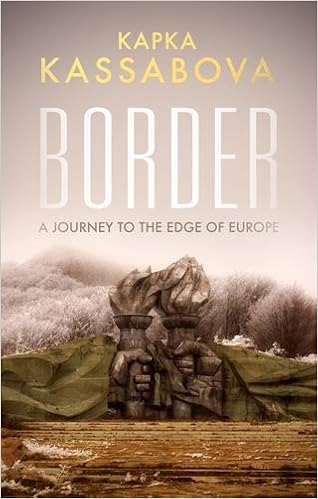
I have always had a thing for borders; grew up on one, and chose eventually to live on another. So it was no surprise that Kapka Kassabova’s account of lives in the Strandja forest – yes, half the size of Wales – which straddles Bulgaria and Turkey, stirred something in me that I have often sensed but sometimes struggled to articulate.
My borders, however, are both ‘soft’ now, and the borders in Kassabova’s book have in their time been – and for some travellers continue to be – as hard as they come.
A border, as someone once said, is an idea wedded to a geography; and borders, more specifically, are places where the dead not only outnumber, but outlive the living.
Kassabova’s border has more than its fair share of ghosts, and she introduces us to them intermittently, until they crowd the pages of her book: the ghosts of Zeus and Europa; the ghosts of pagan fire dancers whose descendants still attend ceremonies in the forest night; Soviet-era ghosts gunned down or captured, tortured and disappeared while attempting to escape the alarmed barbed wire fence – klyon in the argot of the border guards – between Bulgaria and the NATO states of Turkey or Greece; the ghosts of Greek andartes, partisan fighters holed out in the Rhodope Mountains at the end of their country’s attritional civil war and, finally, the apprentice ghosts of Syrian refugees, many of them children, pouring across the border from Turkey into Bulgaria or Greece, seeking the dream of a better life in Germany or Great Britain (fat chance of that).
Kassabova’s skilful interweaving of her own story – two years spent travelling along the borders and their environs – and the stories that she found along the way, is a triumph of synthesis; and yet there is no false sense of completion, of a circle having been squared; no temporarily satisfying but ultimately flawed notion of telos. She knows there are no easy fixes for the devastating mess that is our present tense, and as we struggle with new-found or resurgent nationalisms, new walls, and old lies dressed up as new truths, that – in her words – ‘[n]ew borders will fail just as old borders failed. In the wretched meantime, they will not make our world freer or fairer. Only harder, costlier, and more haunted.’
In an article that was published to coincide with her book’s publication, Kassabova wrote:
“When an inner situation is not made conscious, it appears outside as fate,” said Carl Jung of the psyche. This is the principle of hauntings, time warps and tragedies. In this remotest of border mountains, a poignant form of tourism is practised by the three border nations: ancestral tourism. More than 100 years after the Balkan wars of 1912 to 13 and the politely phrased and brutally executed “exchange of populations” that followed, the Greek, Turkish and Bulgarian grandchildren of the displaced still travel to their ancestors’ villages in Thrace, to the ruined houses, the blackened kitchens where pots and pans were abandoned as people ran for their lives across new borders. It is here that the locals have, for generations, claimed to see a mysterious ball of fire. It may be a freakish phenomenon of light, but it is richly imagined in legends of flying dragons. It appears in liminal spaces – at the entrance of old mines, over the border river, near curative springs – and always after dark, at the witching hour, the hour of the border and its inevitable transgression.
I loved this book, and the way in which its story, although fixed in multiple pasts, kept returning the reader to the present, and the plight of those refugees now desperate to make the journey in the opposite journey to those Soviet-era refuseniks.
A quotation from Neal Ascherson prefaces the middle section of the book: ‘All human populations are in some sense immigrants’. In these strange times it is worth remembering that.
I haven’t read Kassabova’s book, but had the opportunity to travel a bit in the Strandja this past July. My husband, who had defected from Bulgaria in 1985, had never had the opportunity to visit that part of the country and it was interesting to see villages, small towns, and untouched forest that so long had been isolated.
LikeLike
Thanks for your comments, Risabuzatova. Yes, the book has inspired me to travel in that corner of the world also, as well as in the Rhodope Mountains.
LikeLike
It’s a shame you don’t have a donate button! I’d without a doubt donate to this fantastic blog! I suppose for now i’ll settle for book-marking and adding your RSS feed to my Google account. I look forward to fresh updates and will talk about this blog with my Facebook group. Talk soon!
LikeLike